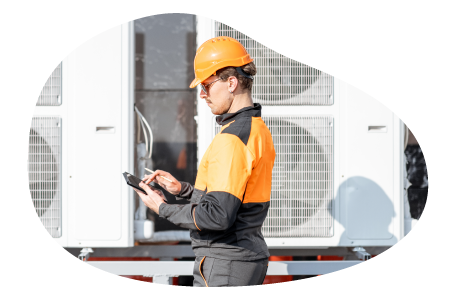
Why do HVAC contractors and businesses need insurance?
Heating, ventilation, and air conditioning (HVAC) work comes with hefty risks. A worker could hurt their back lifting a unit, or an air conditioner could leak and damage a client's floors. HVAC insurance covers medical bills, legal fees, and repair costs. Some policies, like workers' comp, may be required by law.

One application, multiple quotes
Insureon helps residential and commercial HVAC businesses compare insurance quotes from top U.S. providers online.
Get several quotes through our easy online application.
What types of insurance do HVAC contractors need?
These insurance policies cover the most common risks of HVAC installation.
General liability insurance
A general liability policy covers common third-party risks, such as damage to a client’s home while moving an air conditioning unit. It may be required for a commercial lease, loan, or contract.
- Customer bodily injuries
- Customer personal property damage
- Products-completed operations coverage
Business owner's policy
A business owner's policy, or BOP, is a cost-effective way for HVAC installers to buy general liability coverage and commercial property insurance together.
- Accidental damage to a customer's property
- Customer injuries
- Business property damage
Workers’ compensation insurance
Most states require workers' comp insurance coverage for HVAC businesses that have employees. It also protects sole proprietors from work injury costs that health insurance might deny.
- Employee medical expenses
- Disability benefits
- Employer's liability coverage
Commercial auto insurance
This policy covers financial losses in an accident involving an HVAC company's vehicle. Most states require it for business-owned vehicles.
- Medical costs from injuries caused to another person
- Property damage caused by a company vehicle
- Vehicle vandalism and theft
Contractor’s tools and equipment insurance
Repairs or replaces an HVAC technician's psychrometers, multimeters, and other tools if they are damaged, lost, or stolen. It's a type of inland marine insurance that protects mobile property.
- Equipment less than five years old
- Equipment that travels to job sites
- Small tools
Cyber insurance
Cyber insurance helps cover the cost of a data breach or cyberattack at your HVAC installation business. It's sometimes called cyber liability insurance or cybersecurity insurance.
- Data breach notification costs
- Fraud monitoring services
- Cyber incident investigations
How much does business insurance cost for installers?

A small HVAC installation business with a few workers will pay less for insurance than a larger company.
Factors that affect premiums include:
- HVAC installation services offered
- Business property and HVAC equipment
- Annual business revenue
- Types of insurance purchased
- Policy limits, deductibles, and exclusions
How do I get HVAC contractor insurance?
It's easy to get commercial general liability insurance and other HVAC insurance policies if you have your company information on hand. Our application will ask for basic facts about your company, such as revenue and number of employees. You can buy a policy online and get a certificate of insurance with Insureon in three easy steps:
- Complete a free online application.
- Compare insurance quotes and choose policies that meet your insurance needs.
- Pay for your policies and download a certificate.
Insureon's licensed agents work with top-rated U.S. insurance companies to find affordable coverage that fits the risks of installing HVAC systems, whether you're a contractor or an employer.
Verified business insurance reviews
Hear from customers like you who purchased small business insurance.
Common questions about business insurance for HVAC contractors
Review answers to frequently asked questions about HVAC installation contractors business insurance.
What other types of coverage do HVAC installation contractors need?
While general liability insurance and workers' compensation provide crucial protection against workplace injuries and third-party claims, they don't cover every risk. HVAC professionals should also consider:
- Builder's risk insurance: Builder's risk provides coverage for a structure under construction, along with materials, at a construction site. It's sometimes called course of construction insurance.
- Inland marine insurance: Because commercial property insurance only covers items at your main business location, you'll likely need inland marine insurance for items in transit or at a job site. There are two types of coverage HVAC contractors should look at: contractor's tools and equipment insurance and installation floater insurance for materials awaiting installation.
- Commercial umbrella insurance: Umbrella insurance boosts the coverage on your general liability, commercial auto, and employer's liability insurance once the policy limit is reached.
Do HVAC businesses need to be licensed, bonded, and insured?
Most states require HVAC contractors to be licensed before they can offer their services or take on any work, however there are some that don't.
To obtain licensure, each state has its own requirements. Most mandate passing a state exam, work experience, and insurance coverage and surety bonds.
For example:
- Texas: HVAC professionals must obtain a license from the Texas Department of Licensing & Regulation. The license you'll need is based on the HVAC systems you work on. While a Class A license is for any size system, Class B licenses are for smaller size systems.
- California: To work on projects valued at $500 or more, you'll need a California HVAC license and an Environmental Protection Agency (EPA) license. Additionally, you'll have to acquire a $25,000 surety bond and show proof of insurance for the following policies: commercial general liability insurance, commercial auto insurance, and workers' compensation insurance.
- Colorado: While HVAC businesses aren't required to be licensed at the state level, they can become certified. If your HVAC business works with electrical or plumbing, you'll need to obtain the proper license through the Department of Regulatory Agencies (DORA). Local licensing may be required depending on where your business operates.
Some bond and insurance requirements are regulated by your state and local government, like workers' compensation, commercial auto, or various types of surety bonds.
Can installation floater coverage protect HVAC installation equipment?
Installation floater insurance covers building materials and products, such as HVAC systems and ductwork, while they're being installed by an HVAC contractor.
It also extends coverage to the materials while they're in transit or in temporary storage off-site. This insurance coverage is crucial as commercial property coverage doesn't protect items brought to job sites.
A type of inland marine insurance, this specific coverage can help pay for the repair or replacement of materials if they're damaged by an incident such as vandalism, a fire, or a storm.
